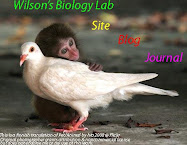
Pork From a Petri Dish... Tantilizing
Are you a vegetarian? Are you a vegetarian because you think the animals are treated badly? If so this could be the answer. Dutch scientists (but they are doing this all over the world) have developed a way to turn pig stem cells into pork. To do this the scientists must take stem cells from a pig muscle and put them in a nutrient soup where they will multiply by the millions. This process, if effective, will be able to save millions of animals that would usually be killed for their meat. Scientists are also thinking about using the stem cells from fish to produce Omega Fatty Acids so that instead of fat, there would be healthy Omega 3 Fatty Acids. This means that your average burger could prevent, not cause heart attacks.
Many experts are criticizing this idea. Some say that, like most new technologies, this one may be dangerous to people. One critic spoke about how taking animals out of slaughterhouses would affect the environment. Others say that the lab made meat would not taste anything like normal pork. Some of their reasons to draw this conclusion are the protein content, and the marbleization of natural meat. In real pork, the meat is about 99% protein. The grown meat is only around 80% protein. In natural meat, fat and other parts of the animal create various almost un-replecatable meat conditions, which make it very good tasting. Supporters of this process argue that people already eat sausages and hot-dogs, so this should not be a problem to put the grown pork into processed meats. This technology could be extremely helpful to developing nations. If food could be grown in places that have a lack of resources, then food could be supplied to people that may be dying of starvation.
NASA has tried to grow this type of meat for trips into space. If meat could be grown on a space-bound shuttle, then astronauts could be able to consume protein from pork, or steaks, or other types of meat. However NASA's tests yielded less than satisfying results. Unfortunately, the geniuses at NASA could only manage to grow pathetically small slivers of meat. NASA decided it would simply be easier for space goers to just eat vegetarian.
Original article from
http://news.yahoo.com/s/ap/20100115/ap_on_he_me/eu_med_petri_pork
Pictures from
https://blogger.googleusercontent.com/img/b/R29vZ2xl/AVvXsEiWWNmcCbqndiJ5_pZII_ReaBuQ9gXps8_gCzSmvVoe3pe-zeRBtkjEGrZvL5w8fjQNZoppzpDhnOI2GY7wgw2xpQuX1VBraObP9e-Yik8wZxs2ZQXqjLPHnyzfOqo8cHVBb2O8bR1RJ6M/s1600-h/pig+in+a+petri+dish2.jpg
http://kategale.files.wordpress.com/2009/09/teacup-pig-trio.jpg
http://www.citizen.org/cmep/images/lots%20of%20dead%20pigs.JPG
http://www.dogbreedinfo.com/art/PigArt.jpg
http://hesdeadjim.squarespace.com/storage/hamburger.jpg
http://static.squidoo.com/resize/squidoo_images/-1/draft_lens1894779module36241022photo_12434633908-75-hunger.jpg
Ilan, WIll, and Danielle 02





Interesting and odd experiment. I believe that the meat, while it isn't perfected now, may be of use to countries dealing with poverty and starvation. It would also make real meat seem fancier, which would feel, kinda odd for most people. But when and if this comes out, the new generation probably won't know the difference, and besides, it's good for the environment and the meat might be safer.
ReplyDeleteI like this idea. Saving pigs and creating extra meat sounds good. However, I'm wondering if the meat will taste the same as regular pig and if they can ever get the texture right. On the other hand, if this project was successful I still think I would rather eat regular pig.
ReplyDeleteI think that this is a great idea. I agree with Scott that saving pigs would be a great idea. Although the scientists may never get the texture right, that's ok, in a hamburger, the meat is maashed up anyway, the same thing goes for sausages. Furthermore, some of the supliments for meat taste a lot worse. It puzzles me why we compare these two types of food, when we don't compare tofu and meat nearly as critically. I think people need to see it as an alternative, not a version of the same thing. If it is developed, I think this will be a very good invention that could benefit people all over the world, and even in space. Just one last thing, if the "meat" were to grow in space wouldn't the growth be different than if it was grown on earth?
ReplyDelete